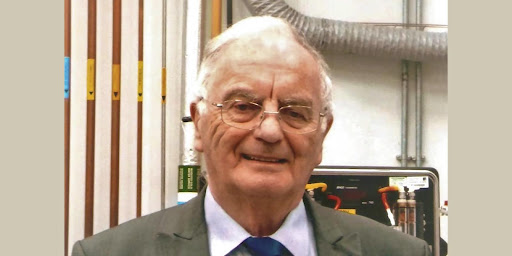-
Emeritus Professor Alan Williams, June 1935- Sept 2023
Date posted:
-
-
-
Post Author
Greg Kelsall
-

I am sorry to relay the passing away on 6 September 2023, of Emeritus Professor Alan Williams, former Livesey Professor of Fuel and Combustion Science at the University of Leeds. Alan was a well known and respected member of the international combustion and energy community and attended many IFRF and British Flame conferences/events. He was a Member of the Council of the British Flame Research Committee from 1986-1991, which at that time was the IFRF UK National Committee.
A full write-up of Alan’s long and illustrious career is available from the University of Leeds, with a few of the many highlights shown below.
Alan was born in Merthyr Tydfil, Wales, where the presence of a large coal heap behind his house may have shaped his early aspirations, as he is best known for his research in areas related to combustion, including coal combustion and pollutant formation.
He moved to Leeds in 1955 to study chemistry as an undergraduate at the University of Leeds, where he remained to pursue PhD research (1957-1959) studying the spontaneous combustion of methyl nitrite and the role of alkoxyl radicals in nitrite pyrolysis.
His interest in combustion continued during his work as a Research Fellow at the University of Leeds funded by the British Gas Fellowship Scheme between 1959 and 1964. This research led to seminal work concerning hydrogen flame kinetics and the development of the first computer models of flame structure. Alan was appointed to the academic staff as a lecturer in 1964, and his talents for strategic vision in research and teaching were recognised through his rapid promotion to the position of Livesey Professor of Fuel and Combustion Science, and Head of the Department of Fuel and Combustion Science in 1973. He was, at age 38, the youngest Professor in the University.
His research in fundamental combustion kinetics continued with work on shock tubes for studying the combustion of hydrogen and methane and Alan started work on nitric oxide formation in flames. The study of flame-generated pollutants was a lifelong theme in his research. During this time, he also developed understanding of the combustion of droplets and sprays of heavy fuel oils, including high-asphaltene fuels.
Alan’s early research in combustion fundamentals later led to coal research where, along with colleagues, models for pulverised coal combustion were developed for the prediction of furnace performance and pollutant formation (nitrogen oxides and soot) – supporting the development of large-scale coal power generation in the UK. As well as pulverised coal combustion, he worked on co-firing biomass up to 100% biomass, and the modelling of gas fired furnaces, including oxy-natural gas and flameless combustion.
Later in his career, he also worked on very small-scale biomass combustion, assessing the design of traditional cooking stoves used by 2.8 billion people worldwide, to help improve their cooking efficiency and reduce emissions through design change.
Alan continued as Head of the Department of Fuel and Energy, and then the Energy and Resources Research Institute, until his retirement in 2000, when he became a Research Professor and continued in active research.
His research output was significant, publishing more than 700 papers and conference publications. He also published four books: Combustion of Sprays of Liquid Fuels (1976); Combustion of Liquid Fuel Sprays (1990); Combustion and Gasification of Coal (2000); and Pollutants Generated by the Combustion of Solid Biomass Fuels (2014).
In 1995, he was awarded Commander of the British Empire for services to the Scientific Development of Fuel Chemistry, and he became a Fellow of the Royal Academy of Engineering in 1999 for his work in Combustion, Energy Conservation, Environment, and Biofuels.
He had many other awards and delivered numerous plenary and keynote lectures. Some examples include the Sugden Award by the Combustion Institute (British Section) in 1993 for the best contribution to Combustion Research and the Robens BCURA Coal Science gold medal (1997), a lecture he delivered in the Royal Institution. In 2017, Alan received the George Westinghouse Gold Medal by the American Society of Mechanical Engineers. This prestigious award recognised his novel research contributions to the fundamental understanding of the formation and reduction of pollutants in fossil fuel flames. He was appointed as a Fellow of the Combustion Institute in 2018 for exceptional research towards the understanding of combustion of gases, liquid fuels, coal, and biomass.
Alan was involved in active research to the point of his death, never losing his extraordinary energy and true love and passion for knowledge and research, and he leaves several started works that will be published posthumously. Alan touched many lives and leaves a rich legacy, not least through the innumerable PhD students he has supervised from all over the world, but also in the wonderful collegiate atmosphere he has imbued in the research community.
